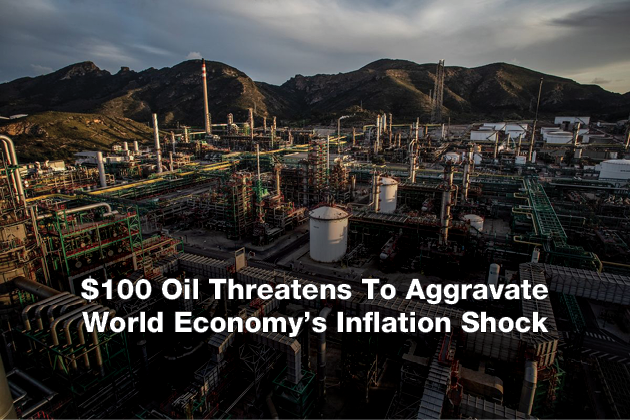The surge in Oil towards $100, which is a barrel for the first time since 2014 is menacing to deal a double- blow to the world economy by further diminishing growth prospects and increasing inflation.
It is a worrying combination for the U.S. Federal Reserve and fellow central banks as they look to contain the strongest price pressures in decades without causing recoveries from the pandemic. Group of 20 finance chiefs will meet virtually this week for the first time this year with inflation among their top concerns.
While, energy exporters stand to benefit from the boom and influence of oil on economies is not what it once was, half of the world will be taking a hit as companies and consumers will find their bills increasing.
According to Bloomberg Economics’ Shock Model, by the end of this month there will be a climb in crude to $100 from around $70. At the end of 2021, it would lift inflation by about half a percentage point in the U.S. and Europe in the next half of the year.
JPMorgan Chase & Co. warns a run-up to $150. A barrel would almost hinder the global expansion and will send inflation spiralling to over 7% which is more than three times the rate targeted by most monetary policy makers.
As compared to last year, oil is about 50% higher which is part of a broader rally in commodity prices that’s swept up by natural gas too. Just two years ago, oil prices jumped briefly below zero.
Fossil fuels, such as oil, as well as coal and natural gas provides more than 80% of the global economy’s energy. The cost of a typical basket of them is now more than 50% as compared to last year, remarked Gavekal Research Ltd., a consultancy.
The energy crunch also increases the ongoing squeeze in global supply chains which increased costs and delayed raw materials and finished goods.
Vivian Lau, who runs a global logistics company based in Hong Kong, said that her customers are already closely watching rising fuel costs.
Lau, vice chair and group chief executive officer of Pacific Air Holdings said that the price of oil is definitely a concern and that the increase is happening at a time when air freight prices are already very high.
Goldman Sachs Group Inc., company which sees oil at $100 in the third quarter estimated a 50% increase which lifts headline inflation by an average of 60 basis points where emerging economies hit most.
This year, the International Monetary Fund recently increased its forecast for global consumer prices to an average of 3.9% in advanced economies, from 2.3%, and 5.9% in emerging as well as developing nations.
China which is the world’s biggest oil importer and goods exporter has so far enjoyed benign inflation. But it’s economy remains at risk as producers are already shuffling high input costs and concerns over energy shortages.
The world economy is no longer the oil guzzler as it was during previous decades, especially in the 1975. Other pandemic-era insulators include swelling household savings and higher wages due to a tight labour market.
In the U.S., the emergence of the shale oil industry meant that its economy is less vulnerable to fuel shocks. This means that while consumers are paying more for gasoline, domestic producers are earning more.
Mark Zandi, chief economist for Moody’s Analytics, estimated that each $10 per barrel increase cuts off 0.1 percentage point of economic growth, the following year. That compares with a 0.3 to 0.4-point blow before the fracking revolution.
Taking the example of Russia’s budget, it could reap more than $65 billion in extra revenue this year, which might help buffer the Kremlin against possible sanctions over Ukraine. Other emerging market producers would benefit, as Canada and Middle Eastern economies would.
Priyanka Kishore of Oxford Economics Ltd., said that a continued rapid rise can raise risks of recession-like conditions in some countries, especially if fiscal policy is also tightening notably and it also estimates that every $10 per barrel increase in oil eats around 0.2 percentage points from world growth.
She said that hopefully this is not the straw that breaks the camel’s back.



